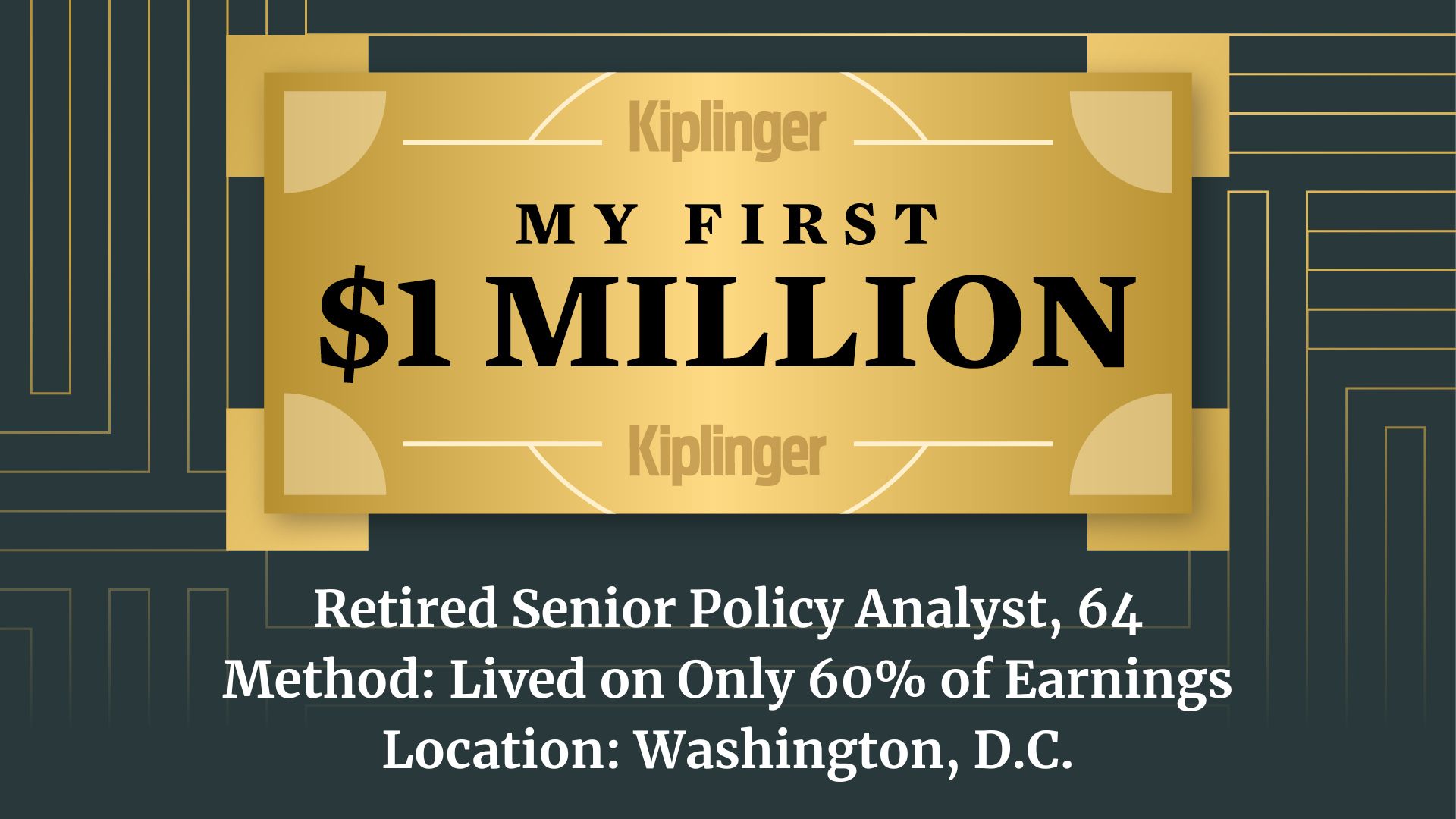Should You Use a Credit Card Travel Portal?
Some credit cards come with travel portals, where you can redeem points and miles for trips. Is it the best option?

Sean Jackson
Profit and prosper with the best of Kiplinger's advice on investing, taxes, retirement, personal finance and much more. Delivered daily. Enter your email in the box and click Sign Me Up.
You are now subscribed
Your newsletter sign-up was successful
Want to add more newsletters?

Delivered daily
Kiplinger Today
Profit and prosper with the best of Kiplinger's advice on investing, taxes, retirement, personal finance and much more delivered daily. Smart money moves start here.

Sent five days a week
Kiplinger A Step Ahead
Get practical help to make better financial decisions in your everyday life, from spending to savings on top deals.

Delivered daily
Kiplinger Closing Bell
Get today's biggest financial and investing headlines delivered to your inbox every day the U.S. stock market is open.

Sent twice a week
Kiplinger Adviser Intel
Financial pros across the country share best practices and fresh tactics to preserve and grow your wealth.

Delivered weekly
Kiplinger Tax Tips
Trim your federal and state tax bills with practical tax-planning and tax-cutting strategies.

Sent twice a week
Kiplinger Retirement Tips
Your twice-a-week guide to planning and enjoying a financially secure and richly rewarding retirement

Sent bimonthly.
Kiplinger Adviser Angle
Insights for advisers, wealth managers and other financial professionals.

Sent twice a week
Kiplinger Investing Weekly
Your twice-a-week roundup of promising stocks, funds, companies and industries you should consider, ones you should avoid, and why.

Sent weekly for six weeks
Kiplinger Invest for Retirement
Your step-by-step six-part series on how to invest for retirement, from devising a successful strategy to exactly which investments to choose.
Credit card companies offer you perks for traveling using their resources. For some, this involves the use of portals.
How they work: Instead of booking your travel directly through an airline, hotel or third-party, you log into your credit card account and use their portal to book your trip. If you have points, cash back or miles saved, you can use these to offset some or all the costs.
While this method is convenient, is it the best option to consider? We'll cover how the portal programs work, how much you can earn when booking travel with specific card providers and factors to consider before using portals.
From just $107.88 $24.99 for Kiplinger Personal Finance
Become a smarter, better informed investor. Subscribe from just $107.88 $24.99, plus get up to 4 Special Issues

Sign up for Kiplinger’s Free Newsletters
Profit and prosper with the best of expert advice on investing, taxes, retirement, personal finance and more - straight to your e-mail.
Profit and prosper with the best of expert advice - straight to your e-mail.
Credit card travel portals overview

Earning points and miles using a rewards credit card is as simple as a swipe. But your credit card company wants to play travel agent, too.
American Express, Bank of America, Capital One and Chase, for example, all have travel portals where cardholders can book flights, hotels, rental cars and more using either their credit card or the points and miles they've earned.
The issuers provide incentives to pack your bags. And if you currently don't have a travel credit card, it pays to consider one. They'll offer significant savings on all facets of your travel, with many featuring perks, such as late checkout and elevated status with your favorite hotel or airline.
Kiplinger Best Travel Cards
Our top picks, powered by Bankrate, offer you generous miles, points or cash back for travel purchases. Advertising disclosure. View Offers
Several cards offer annual travel credits for bookings made through the card's travel portal. Capital One Venture X Rewards cardholders, for example, receive a $300 annual travel credit to use on the Capital One Travel portal. Considering the card's annual fee is $395, it's an easy way to help offset most of the fee and maximize points or miles for doing so.
Using these portals is similar to booking hotel rooms and flights on travel websites such as Expedia, Kayak or any other third-party booking site. But there are some caveats to consider.
American Express travel portal
If you have an American Express credit card that earns Membership Rewards (MR) points, you'll be able to access the Amex travel portal. MR points are worth 1 cent each for flights in the travel portal but are 2 cents apiece when you maximize Amex's transfer partners, according to The Points Guy (TPG), a consumer travel website.
One of the best perks comes with the The Business Platinum Card® from American Express. With this card, you'll earn 35% back when you book flights through Amex Travel using your membership points on up to the first $1,000,000 annually. See rates and fees.
Capital One travel portal
NerdWallet ranked the Capital One travel portal as the most user-friendly, compared to Citi, Chase and American Express.
The company points out one notable feature: The flight calendar, powered by Hopper, which shows the cheapest days to travel. TPG values Capital One points at 1.85 cents.
Furthermore, Capital One offers price drop protection. How this works is once you book a flight, if the price lowers within 10 days, Capital One pays the difference up to $50. You'll also receive price-match, where if you book and find a lower price within 24 hours, Capital One refunds the difference.
Chase Ultimate Rewards portal
You can access the Chase travel portal if you own a card that earns Chase Ultimate Rewards. Points are valued at 2.05 cents, higher than most other travel portals.
The great thing about Chase is that you can pool points if you carry multiple cards, like the Chase Freedom Unlimited and the Chase Sapphire Reserve. Given that the Chase Sapphire Reserve earns 1.5 cents per point redemption, it's a smart way to capitalize on higher redemption values.
To do this, log in to your Chase Ultimate Rewards portal. Scroll down to combine points to activate.
Citi Travel portal
If you own a Citi card that earns ThankYou points, you'll be able to access the Citi Travel portal, where you can rent flights, hotels, rental cars and attractions.
As with other travel portals, several Citi cards earn bonus points on bookings made through the portal. Cardholders can also earn elevated perks, like late checkouts, free breakfast and more when booking hotels through The Hotel Collection.
The biggest downfall, however, is that flights aren't included in these bonuses. Citi ThankYou rewards are valued at 1.8 cents.
What to consider when using a credit card travel portal

Most credit cards require you to book on their travel portal to earn maximum rewards.
For example, holders of the Chase Sapphire Preferred card can earn up to 5-times points per $1 spent on travel purchases made using the Chase Ultimate Rewards portal.
Meanwhile, if you booked directly with the airline or hotel, you’d earn only two points on travel.
Similarly, if you have the Chase Sapphire Reserve card and book travel through the card's portal, you'll earn 10-times points on hotels and car rentals — much better than the 3-times points you'd earn if you booked travel directly.
Additionally, points can be worth more when redeemed through a travel portal. If you have a Sapphire Reserve card, for example, points are worth 1.5 cents per point when used to book travel on the Chase Ultimate Rewards portal, instead of 1 cent per point.
While most portals are easy to use, if you don't want to deal with the additional step, try opening a cash-back card that earns 2% on all purchases.
Flight changes/cancellations
Another concern among travelers is that if anything goes wrong during your trip — let’s say your airline cancels your flight or the hotel loses your confirmation — you would have to call your credit card company for help instead of dealing directly with the airline, hotel or rental car company.
If you need to change your flight plans and you redeemed points or miles for a flight, there’s no guarantee you’ll have those points or miles reissued; you’ll more than likely receive a voucher for future travel.
However, if the airline cancels on you, you’re entitled to a refund to whatever account you used for payment, whether you booked with a credit card or with rewards.
Loyalty programs
Booking via the card portal means you might lose some privileges associated with your hotel or rental car loyalty programs. You might also lose your upgrade privileges. (With airline loyalty programs, you can input your loyalty number when you book via a third party.)
Prices
Though there’s no pattern, the price of tickets on travel portals might be higher than what’s offered on the website of the airline or hotel, Nick Ewen, travel rewards expert at The Points Guy, told Kiplinger.
He mentioned as an example a flight he booked for $300 directly through a major airline's site, after seeing the same flight listed for $329 on a credit card travel portal.
To avoid this — along with any other hiccups associated with third-party bookings — look into transferring your points to your credit card’s loyalty partner program or booking directly with the travel provider, Ewen said.
Related Content
Profit and prosper with the best of Kiplinger's advice on investing, taxes, retirement, personal finance and much more. Delivered daily. Enter your email in the box and click Sign Me Up.

Rivan joined Kiplinger on Leap Day 2016 as a reporter for Kiplinger's Personal Finance magazine. A Michigan native, she graduated from the University of Michigan in 2014 and from there freelanced as a local copy editor and proofreader, and served as a research assistant to a local Detroit journalist. Her work has been featured in the Ann Arbor Observer and Sage Business Researcher. She is currently assistant editor, personal finance at The Washington Post.
- Sean JacksonPersonal finance eCommerce writer
-
 Quiz: Do You Know How to Maximize Your Social Security Check?
Quiz: Do You Know How to Maximize Your Social Security Check?Quiz Test your knowledge of Social Security delayed retirement credits with our quick quiz.
-
 Will You Get a Trump Tariff Refund in 2026? What to Know Now
Will You Get a Trump Tariff Refund in 2026? What to Know NowTax Law The Supreme Court's tariff ruling has many wondering about refund rights and how tariff refunds would work.
-
 2026 Tax Refund Delays: 5 States Where Your Money Is Stuck
2026 Tax Refund Delays: 5 States Where Your Money Is StuckState Tax From New York to Oregon, your state income tax refund could be delayed for weeks. Here's what to know.
-
 Where Olympians Store Their Medals is a Great Lesson For Your Valuables and Cash
Where Olympians Store Their Medals is a Great Lesson For Your Valuables and CashWhat you can learn about protecting your cash and values from where Olympians store their medals.
-
 An Executive's 'Idiotic' Idea: Skip Safety Class and Commit a Federal Crime
An Executive's 'Idiotic' Idea: Skip Safety Class and Commit a Federal CrimeSeveral medical professionals reached out to say that one of their bosses suggested committing a crime to fulfill OSHA requirements. What's an employee to do?
-
 How You Can Use the Financial Resource Built Into Your Home to Help With Your Long-Term Goals
How You Can Use the Financial Resource Built Into Your Home to Help With Your Long-Term GoalsHomeowners are increasingly using their home equity, through products like HELOCs and home equity loans, as a financial resource for managing debt, funding renovations and more.
-
 How to Find Free Money for Graduate School as Federal Loans Tighten in 2026
How to Find Free Money for Graduate School as Federal Loans Tighten in 2026Starting July 1, federal borrowing will be capped for new graduate students, making scholarships and other forms of "free money" vital. Here's what to know.
-
 My First $1 Million: Retired Senior Policy Analyst, 64, Washington, D.C.
My First $1 Million: Retired Senior Policy Analyst, 64, Washington, D.C.Ever wonder how someone who's made a million dollars or more did it? Kiplinger's My First $1 Million series uncovers the answers.
-
 Money Monsters Under the Bed? Here's What You're Really Afraid Of
Money Monsters Under the Bed? Here's What You're Really Afraid OfWhen financial anxiety keeps you awake, money isn't usually the root cause of the problem. Identifying the real demons will help you sleep — and live — better.
-
 Finances Not Going Anywhere? These 3 Steps Can Help You Find Your North Star
Finances Not Going Anywhere? These 3 Steps Can Help You Find Your North StarIf you're overwhelmed by financial planning, a long list of to-dos won't help. Find clarity by focusing on steps built around what's most important to you.
-
 Is Life Insurance Taxable When It's Paid Out?
Is Life Insurance Taxable When It's Paid Out?You received a big check from your loved one's life insurance policy. Will the IRS be expecting a check from you now?
